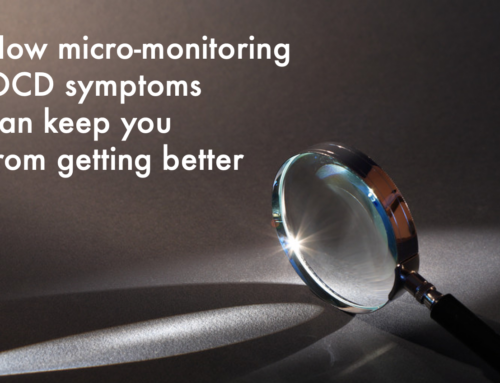 In this era of COVID-19, OCD is being misused ever more frequently, such as “it’s good to be a little OCD” or “we need OCD now,” as if having a mental illness is an adaptive benefit that can protect people from becoming infected with coronavirus.
In this era of COVID-19, OCD is being misused ever more frequently, such as “it’s good to be a little OCD” or “we need OCD now,” as if having a mental illness is an adaptive benefit that can protect people from becoming infected with coronavirus.
As a person who has obsessive compulsive disorder, I can tell you that nothing could be further from the truth.
OCD is the opposite of helpful
Say you’re a caveman who has OCD. Your mind is filled with the thought, “What if a sabertooth tiger tries to kill me when I leave home?” So you sit at the mouth of your cave, spear in hand, watching for the beasts.
 You’re so consumed with knowing for certain that these gigantic cats aren’t near that you miss the creation of your caveson’s first cave drawing. You only notice it as you’re reluctantly leaving your post to attend the meeting about how the tribe is finally going to bag a woolly mammoth, but you’re so visibly distracted by your obsessions about tigers that your tribesman quietly question whether you should even join the hunt.
You’re so consumed with knowing for certain that these gigantic cats aren’t near that you miss the creation of your caveson’s first cave drawing. You only notice it as you’re reluctantly leaving your post to attend the meeting about how the tribe is finally going to bag a woolly mammoth, but you’re so visibly distracted by your obsessions about tigers that your tribesman quietly question whether you should even join the hunt.
Meeting adjourned, you scurry back to your cave, knowing you must return to scanning the savannah. However, you’re so intent on ensuring there are no tigers that you miss the cobra that’s slithered over and is now hovering right behind you, waiting to strike.
As I share in Is Fred in the Refrigerator? Taming OCD and Reclaiming My Life about a near-fatal accident I had during the time I was suffering from untreated OCD, the disorder doesn’t make you better at sensing danger or protecting yourself:
In that state, I had no business participating in risky activities, such as riding Lee, a horse who seemed to think himself a latecomer to the Kentucky Derby. My OCD, off worrying about its typical nonsense of highly unlikely hazards … ignored the true risk facing me every time I mounted up. It missed the opportunity of a lifetime to give me a warning that, for once, would have been useful.
ERP, not OCD, can give people an advantage
Fred is written like a suspense novel, because that’s what life with untreated obsessive compulsive disorder was like. Day after day, year after year of being held hostage with no visible means of escape, the barrel of a gun pressed into my temple as I struggled with heart-pounding fury to do the never-ending compulsions that my captor demanded.
No one needs that, or even a little of that, now or ever.
The advantage people with OCD may have in this pandemic comes not from the disorder, but from doing the evidence-based therapy for it, exposure and response prevention therapy, or ERP. ERP can give you a blackbelt in managing uncertainty and anxiety, an exceptionally useful skillset during this time when almost everything is unknown.
After enduring untreated obsessive compulsive disorder for decades, I cannot overstate how maladaptive the disorder is: it makes you focus on all the wrong things, and the only outcome OCD ensures is that you’re going to miss the life that’s right in front of you.
If all caveman had had OCD, my guess is that the world would now be populated not by billions of humans, but instead by billions of sabertooth tigers … or (gulp) cobras.
What the OCD community wants you to know about #RealOCD
Watch the International OCD Foundation’s new PSA to learn more about what the OCD community wants you to know about #RealOCD. And please share the video to help us reduce and eventually eliminate the use of phrases like “I’m so OCD.” While no one means any harm, the misuse of the name of a serious brain disorder can discourage those who really have OCD from seeking treatment.
To learn more about managing #RealOCD
For more on managing OCD during the COVID-19 pandemic see COVID-19 / Coronavirus and OCD News & Resources.
For more on how I went from having a near-fatal horseback riding accident to learning that my horse held the key to doing exposure and response prevention therapy effectively, see pages 219-225 of Fred.
Sign up for my Shoulders Back! newsletter to receive OCD-taming tips & resources, including notifications of new FredTalks, delivered every month to your inbox.
FredTalks are not a replacement for therapy, and I encourage all readers who have obsessive compulsive disorder to find a competent ERP therapist. See the IOCDF treatment provider database for a provider near you. And never give up hope, because you can tame OCD and reclaim your life!







Leave A Comment